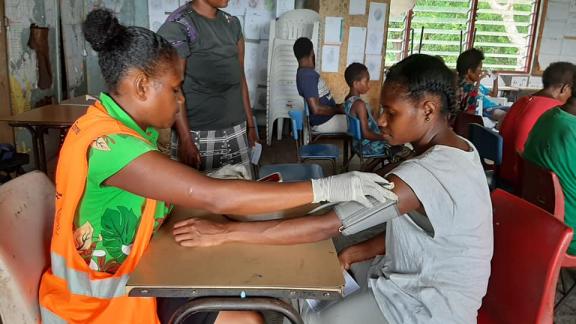November 16, 2015: New Delhi|Kuala Lumpur: Typhoon Koppu (local name Lando) made landfall on the 18th of October inundating several parts of the Luzon area in the Philippines. The typhoon wreaked havoc, causing floods, power outages, road blockages, and has disrupted people’s lives. To address the crucial medical and sexual and reproductive health (SRH) vulnerabilities of the population, theInternational Planned Parenthood Federation (IPPF), through its humanitarian program, the SPRINT Initiative, is providing assistance to affected populations.
Medical and SRH assistance is being provided through the Family Planning Organisation of Philippines (FPOP), a member association of IPPF East & South East Asia and Oceania Region (IPPF ESEAOR), with funding provided by the Australian Department of Foreign Affairs and Trade (DFAT).
“Sexual and Reproductive Health (SRH) is a significant public health need in all communities, especially those facing emergencies. In emergency situations, there is often a lack of access to SRH services,” said Nora Murat, Regional Director, IPPF ESEAOR.
“IPPF-SPRINT implements The Minimum Initial Service Package(MISP) for Reproductive Health, a standard for the provision of essential health service in flood affected areas of Echaque Municipality in Isabela Province of Region II – Cagayan Valley, Philippines. MISP is a coordinated set of priority activities for reducing SRH-related illnesses and deaths in times of emergency” she added.
According to UNOCHA and the updates of the National Disaster Risk Reduction and Management Council, dated 3rdNovember, 2015, more than 3,126,130 people (733,152 families) have been affected. It is estimated that at the peak of the disaster, over 70,500 people (15,604families) were in 376 evacuation centres managed by local authorities. Of the affected population, more than 780,000 are women and girls of reproductive age (15-49 years old) and an estimated 31,000 are pregnant women who require special care.
In crisis situations such as these, there is an increase in gender based violence (GBV) and access to health care becomes more difficult. Whilst the restoration of government services is in full swing, IPPF-SPRINT’s response is to prevent and manage the consequences of sexual violence, reduce the incidence of STI, including HIV, transmission and to prevent excess maternal and neonatal mortality and morbidity. “IPPF-SPRINT will work in close co-ordination with Reproductive Health-Maternal Child Health Working Group, United Nations Population Fund (UNFPA), Department of Health (DOH) and Philippine National Red Cross (PNRC) and FPOP. An amount of USD 35,000 has been mobilised by IPPF-SPRINT to reach out to more than4000 people’’ said Aditi Ghosh, Director, IPPF-SPRINT. “We shall also provide clean delivery kits, emergency obstetric care services and referral, and reproductive health medical teams to attend to the poorest of poor and the most vulnerable.” The efforts are complimented by in-county prepositioned stores, released by UNFPA and funded by the Australian Government, which include reproductive health kits and dignity kits for pregnant and lactating women, and awareness raising information-education-communication (IEC) activities for the affected population.
when
country
Brazil
Related Member Association








